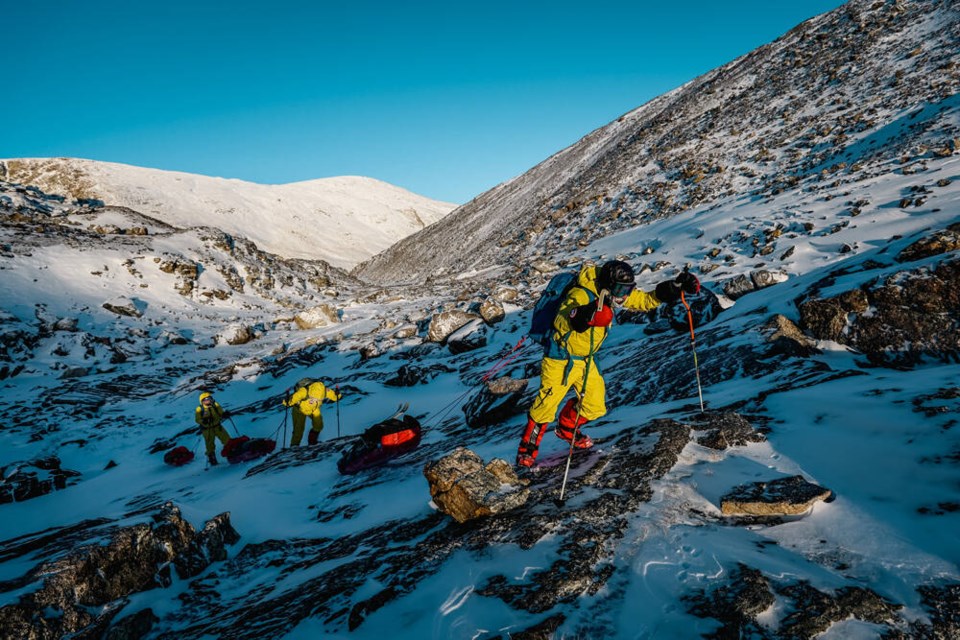At -50 C, it’s cold enough to freeze your teeth off. Don’t believe it? Just ask Kevin Vallely’s dentist.
The Lynn Valley resident has just returned home from a 10-day, 350-kilometre trek/ski/snowmobile trip across Baffin Island’s Paalik Valley, an Inuit overland hunting route in the summer months.
The North Vancouver explorer is no stranger to cold. He’s run across frozen Siberian lakes. He’s camped at the South Pole. He’s done the Iditarod Trail twice. After his trip to Ellesmere Island in 2022, he would have told you it was the coldest place on earth.
Baffin Island in February, however, has stolen that title, thanks largely to the relentless whipping winds.
“At one point, before it died, (our thermometer) registered, -49.7 C. And that was ambient temperature, before wind. And the wind was pumping,” he said. “With upwards of 100 kilometre per hour winds, seriously blowing our tent to pieces in those conditions, I looked at the windchill, and that’s well into the mid -80s C … It’s just mind blowingly the cold.”
At those temperatures, any substance becomes brittle. Plastic cracks instantly. Butter will shatter like glass. Even the densest material on the human body isn’t built for those conditions, as Vallely learned biting into a fig bar.
“I just heard this crack and sure enough, my tooth fell out. It broke off right at the gum line,” he said. “You’ll literally freeze your tooth off.”
At one point, the wind was blowing so hard, they were tent-bound for 40 hours.
Indigenous knowledge
Being physically fit and well-equipped for this sort of nonsense is essential, but without local Inuit knowledge, any trip like theirs would likely end in a frozen grave. For that, they had Billy Arnaquq, a man in his 60s from Qikiqtarjuaq.
“He’s one tough mofo and this is his world,” Vallely said.
Arnaquq confirmed to them it was indeed “too cold,” Vallely said.
Their journeys through the North always reveal the damaging effects colonization has had on Inuit people, but Vallely said they always come away with a deeper respect and a desire to help.
“I recognize the challenges they face and there’s no quick, easy fix or solution, but at least being very conscious of it and having that connection with the people is very important to me.”
Beyond acquiring and benefiting from Indigenous knowledge, the small group were also there to advance Western science, collecting meteorological data for the Weather Network.
Cold vs. chemo
With the use of snowmobiles, traversing the island wasn’t nearly as physically strenuous as some of Vallely’s other exploits. But there was a reason for that. They had a schedule to keep. Crossing the valley has been a longtime desire of Vallely’s adventuring partner Ray Zahab. Zahab, however, was diagnosed with lymphoma in 2022. At the time they did the trip, Zahab was in between rounds of chemotherapy. With little ability to fight of infection, Zahab’s doctors advised them to be extremely careful as even a small cut of frostbite could end up being fatal.
“The objective was not to do some heroic amount of skiing per day. The objective was not to prove our ability to haul some big-ass sled,” he said. “The objective of this journey was to get out and explore this area of land, which none of us had been on and very few people go to, at the time of year when no one travels and see if we can do it safely and effectively with, frankly, this guy who was really leading the charge who has cancer. That was the inspiration for me.”
Just a couple of days after they arrived back, Vallely had his tooth temporarily glued back in place and Zahab is back in chemo.
Last week I was pulling a 100lb sled across the Arctic, trying not to wipe out on technical terrain, doing my best to avoid frostbite and polar bears too😂….this week I’m just trying to make it to the bathroom without wiping out on all these damn chemo drug tubes and cords 😂 pic.twitter.com/lqCzEgvmno
— Ray Zahab (@RayZahab) February 23, 2023
Northern lights
As part of the Vancouver International Mountain Film Festival, Vallely has a speaking engagement on Sunday in which he’ll be sharing some practical know-how for anyone else planning an extreme adventure like his.
But spending weeks in the arctic, crossing hellish terrain isn’t for everyone. There is another takeaway Vallely hopes the broader community will get from his latest trip, particularly as it relates to Zahab.
“If you have a goal, you’ve got to live your life. We don’t have much time, frankly. None of us do. And it’s so often we put things off,” he said. “That’s where you see the light. When you’re really out of your comfort zone, you see things you can never see otherwise.”



